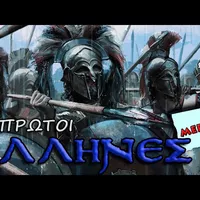Πότε Ήρθαν οι Πρώτοι Έλληνες στον Ελλαδικό Χώρο; (Μέρος 2)
Σε προηγούμενο αφιέρωμά μας παρουσιάσαμε διάφορες θεωρίες σύγχρονων ιστορικών
σχετικές με την άφιξη των Ελλήνων στον ελλαδικό χώρο, όπως τις συγκέντρωσε και τις κατέγραψε ο ιστορικός και ακαδημαϊκός Μιχαήλ Σακελλαρίου.
Τι έχουν όμως να μας πουν οι αρχαίες πηγές σχετικά με αυτό το θέμα;
Συμφωνούν ή διαφωνούν οι αρχαίοι ιστορικοί με τους σύγχρονους;
Καλώς ήρθατε στο κανάλι Alpha Ωmega.
Σε αυτό το βίντεο θα σας παρουσιάσουμε μερικές από τις καταγραφές αρχαίων ιστορικών σχετικά με την καταγωγή των αρχαίων Ελλήνων.
Αν επισκέπτεσθε για πρώτη φορά το κανάλι μας μην ξεχάσετε να κάνετε Εγγραφή
και να πατήσετε στο εικονίδιο με το κουδούνι για να ειδοποιήστε κάθε φορά που ανεβάζουμε νέο βίντεο.
Τι λέτε, πάμε να ξεκινήσουμε;
Οι αρχαίοι συγγραφείς (Ηρόδοτος, Θουκυδίδης κ.α.), όπως θα δούμε πιο κάτω,
αναφέρουν ότι η χώρα που σήμερα καλείται Ελλάδα αρχικά καλούνταν Πελασγία ,
επειδή εκεί αρχικά ζούσαν διάφορα φύλα που καλούνταν Δρύοπες, Καύκωνες, Πελασγοί, Λέλεγες κ.α.
με πιο πολυπληθές το Πελασγικό και του οποίου τα επιμέρους φύλλα καλούνταν Αχαιοί, Ίωνες, Δωριείς και Αιολείς.
Ακολούθως, επειδή οι Πελασγοί μετονομάστηκαν σε Έλληνες, η χώρα Πελασγία μετονομάστηκε σε Ελλάδα.
Ο Ηρόδοτος συγκεκριμένα, σχετικά με την καταγωγή και τη δημιουργία του Ελληνικού έθνους, αναφέρει τα εξής:
1) Αρχικά όλοι οι άνθρωποι ήταν βάρβαροι και σε κάποια στιγμή ξέκοψαν από αυτούς οι Πελασγοί
και αποτέλεσαν ξέχωρο έθνος, το Ελληνικό, και μετά προσχώρησαν σ' αυτό όλοι οι Πελασγοί, καθώς και πολλά άλλα βάρβαρα φύλα.
2) Οι Δωριείς ήταν έθνος αφενός Ελληνικό, απόγονοι του Δώρου γιου του Έλληνα και αφετέρου πολυπλάνητο.
Στα χρόνια του βασιλιά Δευκαλίωνα οι Δωριείς κατοικούσαν στη Φθιώτιδα.
Από εκεί και επί βασιλιά Δώρου (απ΄ όπου πήραν το όνομα Δωριείς ) πήγαν στις πλαγιές της Όσσας και του Ολύμπου, στην Ιστιαιώτιδα.
Από εκεί τους ξεσήκωσαν οι Καδμείοι και πήγαν και κατοίκησαν στην Πίνδο με το όνομα έθνος Μακεδνόν.
Τέλος από την Πίνδο κάποιοι από αυτούς πήγαν στη Δρυοπία και από εκεί στην Πελοπόννησο.
3) Οι Λακεδαιμόνιοι, οι Κορίνθιοι, οι Σικυώνιοι, οι Επιδαύριοι, οι Τροιζήνιοι, οι Ερμιονείς της Πελοποννήσου
που έστειλαν πλοία για απόκρουση των Περσών στον Ισθμό και στη Σαλαμίνα, εκτός των Ερμιονέων,
ανήκουν στο Δωρικό και Μακεδνόν έθνος, που μετοίκησαν στην Πελοπόννησο από το Ερινεόν και την Πίνδον.
Ο Ησίοδος, ο Ευριπίδης κ.α. ονομάζουν στα έργα τους Έλληνες όσους εκστράτευσαν στην Τροία, επειδή η εκστρατεία αυτή θεωρήθηκε,
όπως αναφέρει και ο Θουκυδίδης, ως η πρώτη κοινή Ελληνική συνεργασία των Ελλήνων κατά των βαρβάρων της Ασίας.
Συγκεκριμένα ο Ευριπίδης στην Ιφιγένεια εν Ταύροις αναφέρει:
"Χίλια καράβια Ελληνικά εκεί πέρα ο Αγαμέμνονας είχε μαζεμένα,
τ' ωραίο στεφάνι θέλοντας της νίκης για τους Αχαιούς να πάρει από την Τροία,
μα και για το Μενέλαο, που τον είχαν προσβάλει αρπάζοντάς του την Ελένη…"
Οι αρχαίοι συγγραφείς, όπως είπαμε νωρίτερα, αναφέρουν ότι στην Ελλάδα αρχικά ζούσαν μεταναστευτικά διάφορα φύλα
που καλούνταν Δρύοπες, Καύκωνες, Πελασγοί, Λέλεγες, Δαναοί, Πέλοπες κ.α. με πιο πολυπληθές το Πελασγικό, το οποίο θεωρούνταν και αυτόχθων,
επειδή ήταν το πρώτο φύλο που είχε κατοικίσει στην Ελλάδα.
Για τον ίδιο λόγο αρχικά η Ελλάδα καλούνταν Πελασγία.
Αναφέρουν επίσης ότι επιμέρους φύλα των Πελασγών ήταν οι Δωριείς, οι Αιολείς, οι Ίωνες και οι Αχαιοί
και κάποια στιγμή αποκόπηκαν πρώτα οι Δωριείς από τους Πελασγούς και αποτέλεσαν ξέχωρο έθνος, το Ελληνικό
και σ' αυτό μετά προστέθηκαν οι υπόλοιποι Πελασγοί, καθώς και κάποιοι άλλοι βάρβαροι (οι Καδμείοι ή Θηβαίοι, οι Δαναοί κ.α.).
Ο Θουκυδίδης αναφέρει ότι πριν από τα Τρωικά δεν υπήρχαν σύνορα και κράτη
ούτε και οι ονομασίες Έλληνες και βάρβαροι, διαφορετικά αυτό θα το ανέφερε ο Όμηρος.
Αυτά δημιουργήθηκαν μετά τα Τρωικά.
Αναφέρει επίσης ότι αρχικά στην Ελλάδα υπήρχαν διάφορα φύλα που ζούσαν μεταναστευτικά, επειδή δεν είχε επινοηθεί ακόμη η γεωργία,
με πολυπληθέστερο τους Πελασγούς και ο Όμηρος με το όνομα Έλληνες ονομάζει μόνο εκείνους
που ακολούθησαν τον Αχιλλέα από τη Φθιώτιδα στον πόλεμο της Τροίας, οι οποίοι ήταν και οι πρώτοι Έλληνες.
Ο Στράβωνας, επικαλούμενος τον Όμηρο και τον Ησίοδο, αναφέρει ότι οι πρώτοι κάτοικοι της Ελλάδος
ήταν οι Πελασγοί, οι οποίοι ήταν διασκορπισμένοι σε όλη την αρχαία Ελλάδα.
Ο Εκαταίος ο Μιλήσιος σχετικά με τους πρώτους κατοίκους της αρχαίας Ελλάδας, αναφέρει τα εξής:
«Εξάλλου, ολόκληρη σχεδόν η Ελλάδα κατοικία βαρβάρων υπήρξε, στους παλιούς καιρούς,
έτσι λογάριαζαν όσοι μνημονεύουν αυτά τα πράγματα, γιατί ο Πέλοπας έφερε ένα λαό από τη Φρυγία
στη χώρα που απ' αυτόν ονομάστηκε Πελοπόννησος, κι ο Δαναός από την Αίγυπτο, κι οι Δρύοπες, οι Καύκωνες κι οι Πελασγοί κι οι Λέλεγες
και άλλοι τέτοιοι λαοί μοίρασαν τους τόπους πάνω και κάτω από τον ισθμό.
Γιατί την Αττική κατέλαβαν Θράκες που ήρθαν με τον Εύμολπο, τη Δαυλίδα της Φωκίδας ο Τηρεύς την Καδμεία
οι Φοίνικες που ήρθαν με τον Κάδμο, και την ίδια τη Βοιωτία κατέκτησαν οι Άονες, οι Τέμμικες και οι Ύαντες.»
Ο Διονύσιος Αλικαρνασσέας στη Ρωμαϊκή Αρχαιολογία αναφέρει ότι οι Πελασγοί ήταν φύλο Ελληνικό,
που από τη Θεσσαλία εξαπλώθηκαν σε πάρα πολλά μέρη της Ασίας και Ευρώπης.
Ο Αισχύλος αναφέρει ότι ο βασιλιάς του Άργους καυχιόταν λέγοντας ότι είναι στο γένος Πελασγός
και το γένος των Πελασγών άρχει μέχρι της Παιονίας και του Στρυμόνος ποταμού.
Ο Απολλόδωρος αναφέρει ότι πριν να ονομάσει ο Πέλοπας την Πελοπόννησο με το όνομά του, δηλαδή Πελοπόννησος, η νήσος λέγονταν Άπια και Πελασγιώτιδα.
Αναφέρει επίσης ότι οι κάτοικοι της Πελοποννήσου ήταν απόγονοι του Άργου και του Πελασγού,
παιδιών του Δία και της Νιόβης, απ΄όπου οι Πελοποννήσιοι ονομάσθηκαν Πελασγοί.
Αναφέρει επίσης ότι ο Πελασγός και η Μελίβοια, κόρη του Ωκεανού ή κατ' άλλους η Κυλλήνη, γέννησαν το Λυκάονα,
το βασιλιά των Αρκάδων που με πάρα πολλές γυναίκες απόκτησε 50 γιους,
τον Θεσπρωτό, Μάκεδνο, Μαίναλο, Φθίο, Λύκιο, Ορχομενό … και έτσι, εννοείται, οι Πελασγοί εξαπλώθηκαν σ' όλη την Ελλάδα.
Αυτές λοιπόν είναι μερικές από τις καταγεγραμμένες απόψεις αρχαίων ιστορικών σχετικά με την καταγωγή και προέλευση των αρχαίων Ελλήνων.
Υπάρχουν και άλλες καταγραφές σε πολλά κείμενα τις οποίες για χάριν συντομίας του βίντεο δεν τις αναφέραμε.
Τα σχόλια και τα συμπεράσματα δικά σας. Να είστε όλες και όλοι καλά.

